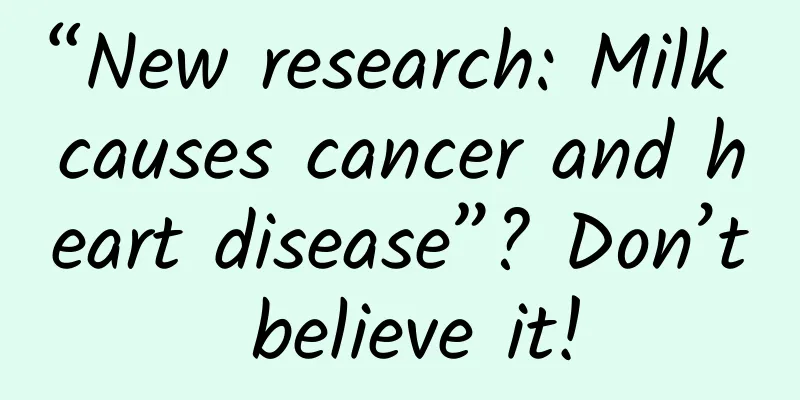“New research: Milk causes cancer and heart disease”? Don’t believe it!

|
Rumor: "Drinking milk regularly will increase the risk of cancer in Chinese people and may also increase the risk of heart disease in women" Recently, a statement has been widely circulated, "The latest research abroad has found that drinking milk increases the risk of heart disease and cancer." The content quoted a Swedish study in 2024 - "Compared with drinking 0.5 cups (100 ml) a day, drinking 2 cups (400 ml) of milk a day increases the risk of ischemic heart disease by 5%, drinking 3 cups (600 ml) a day increases the risk by 12%, and drinking 4 cups (800 ml) a day increases the risk by 21%" and a 2022 study - "People who regularly consume dairy products have a 9% increased overall cancer risk, an 18% increased liver cancer risk, and a 22% increased risk of female breast cancer." Myth analysis: Not true. This is a misunderstanding of the research. The studies on "milk increases the risk of heart disease" and "milk increases the risk of cancer in Chinese people" are both prospective cohort studies. The results obtained are observational results, not causal relationships. It only observed that there is a correlation between the two things, but it is not possible to determine the causal relationship if milk does not directly cause heart disease and cancer. The current intake of dairy products by Chinese residents is very low, so what we should do is drink more milk and drink enough milk. The Dietary Guidelines for Chinese Residents recommend that we drink 300 to 500 grams of milk every day. Dairy products (including milk, cheese, yogurt, etc.) are rich in nutrients, and many people recommend that we drink milk. However, there is news that a new study abroad has found that drinking milk increases the risk of heart disease and cancer. Does milk really cause heart disease and cancer? Can we still drink milk safely in the future? Does drinking milk regularly increase the risk of heart disease? The study mentioned in the news that "milk increases the risk of heart disease" was conducted by Swedish scientists [1]. This study analyzed 100,775 participants in two Swedish prospective cohort studies, obtained the participants' diet, lifestyle factors and plasma proteomics data from the cohort, analyzed the effect of milk intake on the risk of ischemic heart disease (IHD) and acute myocardial infarction (MI), and analyzed the relationship between milk intake and cardiac metabolism-related proteins in plasma. Research screenshots During the 33-year follow-up, a total of 17,896 IHD cases and 10,714 MI cases were recorded. After analysis, it was found that compared with drinking 0.5 cups (100 ml) per day, drinking 2 cups (400 ml) of milk per day increased the risk of ischemic heart disease by 5%, drinking 3 cups (600 ml) per day increased the risk by 12%, and drinking 4 cups (800 ml) per day increased the risk by 21%. How should we view this research? First of all, this study analyzed the results of a prospective cohort study, and the results obtained are observational results, not causal relationships. It only observed that there is a correlation between the two things, but it is not that milk directly causes heart disease, so it is impossible to determine the causal relationship, that is to say, it does not mean that drinking milk will cause heart disease. Secondly, the intake of dairy products by Chinese residents is very low, and the impact is even smaller. The results found in this study showed that compared with drinking 100 ml a day, drinking 2 cups (400 ml) of milk a day only increased the risk of ischemic heart disease by 5%, drinking 3 cups (600 ml) a day increased the risk by 12%, and drinking 4 cups (800 ml) a day increased the risk by 21%. However, the per capita milk intake in our country is only about 240 ml, and only 24.2% of people meet the daily dairy product intake standard, so the increased risk of heart disease is almost negligible. Copyrighted stock images, no reproduction is authorized In fact, there is more research evidence showing that drinking milk in moderation does not increase the risk of heart disease. For example, a systematic review of the relationship between different dairy products (including low-fat/full-fat dairy products, milk, cheese, and yogurt) and cardiovascular disease (CVD) and the impact of dairy products on major cardiovascular risk factors found that daily dairy consumption of no more than 200 grams was not associated with all-cause mortality, CVD/CHD morbidity, and mortality, including milk, cheese, and yogurt, whether full-fat or low-fat [2]. The American Heart Association's dietary recommendations for cardiovascular disease also point out that dairy products are acceptable [3]. However, since Americans consume a high amount of dairy products, nearly 500 grams per person per day, they recommend eating low-fat or skim dairy products. my country's dietary guidelines recommend that the average adult consume 300g to 500g of milk and dairy products per day, but the actual intake is less than one-tenth of the recommended amount, and only one-fifteenth of the actual average intake in Europe and the United States. Therefore, there is no need to worry about drinking milk causing heart disease. Does milk increase cancer risk? The news also said that "drinking milk can cause cancer", which refers to a 2022 study. Research screenshots The study tracked data from more than 510,000 adults in ten different regions of China using data from national cancer and death registries and health insurance records to analyze the relationship between dairy intake and cancer risk. Among these people, 20.4% consumed dairy products (mainly milk) frequently (at least once a week), and 68.5% never or rarely consumed dairy products. The average dairy product consumption was 37.9 g/day, while the average consumption of regular consumers was 80.8 g/day. The results showed that regular dairy product consumers had a 9% higher risk of developing cancer overall, an 18% higher risk of developing liver cancer, and a 22% higher risk of developing female breast cancer. For every 50 g of dairy product consumed per day, the risk of overall cancer, liver cancer, and female breast cancer would increase by 7%, 12%, and 17%, respectively [4]. Many people, seeing that this is a Chinese study, with a large sample of 500,000 people and a long-term follow-up of nearly 20 years, will worry whether drinking milk really causes cancer. In fact, this is completely unnecessary. Like the heart disease study mentioned above, this study is also an observational study. The results found are observational results, not causal relationships, and it is still too early to draw a final conclusion. Moreover, the data of this study started in 2004, which was the period of the fastest economic development in China. During this period, people's lifestyles changed rapidly. For example, people ate more meat, drank more alcohol, smoked more, exercised less, and worked more late at night. These factors also increase the risk of cancer. Moreover, our milk intake has not increased much in recent years, and it is only about 27 grams per day. It is too unfair to blame milk for cancer when we drink so little milk. Copyrighted stock images, no reproduction is authorized The claim that milk causes cancer has been around for a long time. The earliest claim was that it was because of the sex hormones in milk and insulin-like growth factor-1 (IGF-1) in the blood. But in fact, the content of sex hormones and IGF-1 in milk is very low, and the amount is negligible compared to the hormones secreted by the human body itself[5]. In fact, some authoritative organizations in the world do not believe that drinking milk causes cancer. For example, the American Cancer Society believes that there is no evidence that drinking milk increases the risk of breast cancer[6]. The International Fund for Research on Cancer's latest food and cancer assessment report pointed out that there is strong evidence that dairy products are likely to reduce the risk of colorectal cancer, while the evidence for breast cancer and prostate cancer is insufficient and contradictory[7]. Therefore, drinking milk not only does not cause cancer, but it may also reduce the risk of certain cancers. Would you like some milk? Milk and dairy products are rich in high-quality protein, calcium and other nutrients, which can meet the nutritional needs of residents of all ages. Adequate intake of milk and dairy products is beneficial to human health, especially muscle and bone health. For this reason, the Chinese Dietary Guidelines recommend that we drink 300 to 500 grams of milk every day. According to the China Health and Nutrition Survey (CHNS) (2018), the daily intake of milk and dairy products by Chinese adults in 2018 was 27.9 g, far below the recommended amount. For this reason, this year my country also released the core message of "reducing oil, increasing soybeans, and adding milk" to encourage people to drink more milk. Therefore, what we should do now is to drink more milk, drink enough milk, and not be afraid to drink milk because of some unfounded accusations. Looking in the mirror of rumors It is difficult to tell whether a statement is a rumor or not by citing certain papers, research and data. We can understand the difference between "observational research" and "causal research": 1. Intervention and control Observational study: In observational studies, researchers do not actively intervene in the subjects. They simply collect data and record the natural state of variables without controlling experimental conditions. Causal research: In causal research, especially experimental research, the researcher actively intervenes to test the hypothesis by random assignment or controlling the experimental conditions to determine cause and effect. 2. Research objectives: Observational studies: These studies are designed to describe and relate variables, identify risk factors, or describe the distribution of a disease or health condition in a specific population. Causal research: The purpose is to determine whether one variable causes a change in another variable, that is, to determine the cause-effect relationship. 3. Interpretation of results: Observational studies: Results are usually interpreted as associations and further research is needed to determine whether a cause-effect relationship exists. Causal research: The results can be directly interpreted as cause and effect because the research design allows the researcher to control for the influence of other variables. References [1] Michaëlsson, K., Lemming, EW, Larsson, SC et al. Non-fermented and fermented milk intake in relation to risk of ischemic heart disease and to circulating cardiometabolic proteins in Swedish women and men: Two prospective longitudinal cohort studies with 100,775 participants. BMC Med 22, 483 (2024). https://doi.org/10.1186/s12916-024-03651-1 [2]Giosuè A, Calabrese I, Vitale M, Riccardi G, Vaccaro O. Consumption of Dairy Foods and Cardiovascular Disease: A Systematic Review. Nutrients. 2022 Feb 16;14(4):831. doi: 10.3390/nu14040831. PMID: 35215479; PMCID: PMC8875110. [3]Lichtenstein AH, et al. 2021 Dietary Guidance to Improve Cardiovascular Health: A Scientific Statement From the American Heart Association. Circulation. 2021 Dec 7;144(23):e472-e487. doi: 10.1161/CIR.0000000000001031. Epub 2021 Nov 2. PMID: 34724806. [4]Kakkoura, MG, Du, H., Guo, Y. et al., (2022). Dairy consumption and risks of total and site-specific cancers in Chinese adults: an 11-year prospective study of 0.5 million people. BMC Med 20, 134 (2022). https://doi.org/10.1186/s12916-022-02330-3 [5] Fan Zhihong, Li Nannan. Dairy product consumption and cancer risk control[J]. Chinese Food and Nutrition, 2011, 17(1): 78-82. [6] https://www.cancer.org/latest-news/how-your-diet-may-affect-your-risk-of-breast-cancer.html. [7]https://www.wcrf.org/dietandcancer/breast-cancer Author: Ruan Guangfeng, Deputy Director of Kexin Food and Health Information Exchange Center Review丨Zhang Yu, researcher at the Chinese Center for Disease Control and Prevention, national health science expert |
<<: World Immunization Day | Why is the best medicine in the human body?
>>: #千万IP创科普# Avoid lightning! Air fryers frequently catch fire, you may have been using it wrong
Recommend
How to create a popular internet celebrity brand from 0 to 1?
Since last year, consumption has once again becom...
up to date! Data rankings of 59 advertising platforms!
Let’s take a detailed look at the data performanc...
How to use the video account? Popular tips on the video account
If we talk about the short video platform that wa...
Perhaps this is the best solution to increase TV ratings: Medium-length videos expand the new blue ocean of large-screen content
For many people born before the millennium, for a...
Are people with this blood type more likely to get cancer? Is it reliable to predict cancer based on blood type?
People often ask: Is blood type related to cancer...
A set of logic that may be suitable for all new media to increase followers!
Output makes people grow, output makes people gro...
Solar hydrogel: the "water cycle master" for greenhouse cultivation
Produced by: Science Popularization China Author:...
Ali Baichuan is here: Who might have a headache?
Yesterday, Alibaba Wireless launched the Baichuan...
Yoga Beginner Video
Introduction to Yoga Beginner Video Resources: Co...
Online earning sideline project, you will get income if you browse, you can do it all over the world
Online earning sideline project, there is income ...
Long March 6A: my country's first solid-liquid carrier rocket
Friends who are familiar with foreign launch vehi...
Enjoying the leisurely pace of slow pace: GAC New Energy Beijing Zhongguang Xinda 25 hours experience center grandly opened
On March 26, GAC New Energy's 25-hour experie...
The scientist who was so tired that he fell asleep on the toilet became the winner of this year's National Highest Science and Technology Award
▲Xue Qikun milestone The first time I met Academi...
Electric Technology Car News: After five years of poor sales, can the Lifan 620EV, which relies on new energy, make a comeback?
Chongqing Lifan Automobile Co., Ltd. is a profess...
WM Motor will deliver large-scale vehicles by the end of September, and its affordable prices will help popularize smart electric vehicles
As one of the representatives of new car companie...




![Mr. Crab's 7 ways to make big sales through live streaming, revealing the major live streaming routines on the entire network [Video Course]](/upload/images/67cc2d4576db7.webp)




